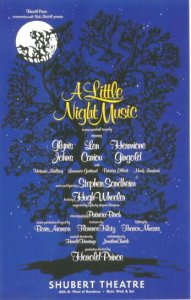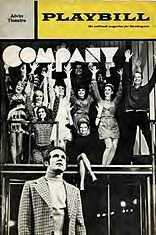Related Research Articles

A Little Night Music is a musical with music and lyrics by Stephen Sondheim and book by Hugh Wheeler. Inspired by the 1955 Ingmar Bergman film Smiles of a Summer Night, it involves the romantic lives of several couples. Its title is a literal English translation of the German name for Mozart's Serenade No. 13, K. 525, Eine kleine Nachtmusik. The musical includes the popular song "Send In the Clowns", written for Glynis Johns.

Stephen Joshua Sondheim was an American composer and lyricist. Regarded as one of the most important figures in 20th-century musical theater, he is credited with reinventing the American musical. With his frequent collaborators Harold Prince and James Lapine, Sondheim's Broadway musicals tackled unexpected themes that ranged beyond the genre's traditional subjects, while addressing darker elements of the human experience. His music and lyrics are tinged with complexity, sophistication, and ambivalence about various aspects of life.

Dont Look Back is a 1967 American documentary film directed by D. A. Pennebaker that covers Bob Dylan's 1965 concert tour in England.

Company is a musical with music and lyrics by Stephen Sondheim and book by George Furth. The original 1970 production was nominated for a record-setting 14 Tony Awards, winning six. Company was among the first book musicals to deal with contemporary dating, marriage, and divorce, and is a notable example of a concept musical lacking a linear plot. In a series of vignettes, Company follows bachelor Bobby interacting with his married friends, who throw a party for his 35th birthday.
Cinéma vérité is a style of documentary filmmaking developed by Edgar Morin and Jean Rouch, inspired by Dziga Vertov's theory about Kino-Pravda. It combines improvisation with use of the camera to unveil truth or highlight subjects hidden behind reality. It is sometimes called observational cinema, if understood as pure direct cinema: mainly without a narrator's voice-over. There are subtle, yet important, differences between terms expressing similar concepts. Direct cinema is largely concerned with the recording of events in which the subject and audience become unaware of the camera's presence: operating within what Bill Nichols, an American historian and theoretician of documentary film, calls the "observational mode", a fly on the wall. Many therefore see a paradox in drawing attention away from the presence of the camera and simultaneously interfering in the reality it registers when attempting to discover a cinematic truth.

Donn Alan Pennebaker was an American documentary filmmaker and one of the pioneers of direct cinema. Performing arts and politics were his primary subjects. In 2013, the Academy of Motion Picture Arts and Sciences recognized his body of work with an Academy Honorary Award. Pennebaker was called by The Independent as "arguably the pre-eminent chronicler of Sixties counterculture".
A cast recording is a recording of a stage musical that is intended to document the songs as they were performed in the show and experienced by the audience. An original cast recording or OCR, as the name implies, features the voices of the show's original cast. A cast recording featuring the first cast to perform a musical in a particular venue is known, for example, as an "original Broadway cast recording" (OBCR) or an "original London cast recording" (OLCR).
Thomas Z. Shepard is an American record producer who is best known for his recordings of Broadway musicals, including the works of Stephen Sondheim. Shepard is also a composer, conductor, music arranger and pianist.

Elaine Stritch was an American actress, known for her work on Broadway and later, television. She made her professional stage debut in 1944 and appeared in numerous stage plays, musicals, feature films and television series. Stritch was inducted into the American Theater Hall of Fame in 1995.

Forbidden Broadway Strikes Back is a version of Forbidden Broadway created by Gerard Alessandrini. It previewed September 5, 1996 and opened at the Triad Theater October 16, 1996. The show won Alessandrini the 1997 Drama Desk Award for Outstanding Lyrics and was nominated for the 1997 Drama Desk Award for Outstanding Revue.

Ute Gertrud Lemper is a German singer and actress. Her roles in musicals include playing Sally Bowles in the original Paris production of Cabaret, for which she won the 1987 Molière Award for Best Newcomer, and Velma Kelly in the revival of Chicago in both London and New York, which won her the 1998 Olivier Award for Best Actress in a Musical.

P. J. Clarke's is a saloon and gastropub, established in 1884 and is one of the oldest continuously operating restaurants in NYC. It occupies a building located at 915 Third Avenue on the northeast corner of East 55th Street in Manhattan. It has a second location at 44 West 63rd Street on the southeast corner of Columbus Avenue. as well as a location at 250 Vesey St in Battery Park. Outside of NYC, there are locations in Philadelphia and Washington, DC. The restaurant is primarily known for its hamburgers such as the Cadillac.

Liz Callaway is an American actress, singer and recording artist, who is best known for having provided the singing voices of many female characters in animated films, such as Anastasia in Anastasia, Odette in The Swan Princess, Jasmine in the Aladdin sequels The Return of Jafar and Aladdin and the King of Thieves, adult Kiara in The Lion King II: Simba's Pride, and a dancing napkin ring in Beauty and the Beast. She was also the original Ellen in the Broadway production of Miss Saigon.

Elaine Stritch at Liberty is an autobiographical one-woman show written by Elaine Stritch and John Lahr, and produced by George C. Wolfe, which is composed of anecdotes from Stritch's life, as well as showtunes and Broadway standards that mirror Stritch’s rise and fall both on and off the stage.

Chris Hegedus is an American documentary filmmaker. She and her husband, filmmaker D. A. Pennebaker, founded the company Pennebaker Hegedus Films.

Telly Leung is an American actor, director, singer and songwriter. He is known for his work in musical theatre on Broadway and for his role as Wes, a member of the Dalton Academy Warblers on the Fox comedy-drama series Glee. In 2011, he starred in the Broadway revival of Godspell at the Circle in the Square Theatre.
"I'm Still Here" is a song written by Stephen Sondheim for the 1971 musical Follies.
"The Ladies Who Lunch" is a song from the Broadway musical Company, sung by the character Joanne. It was written by Stephen Sondheim, and was introduced by Elaine Stritch. It became her signature song.

Documentary Now! is an American mockumentary television series created by Fred Armisen, Bill Hader, Seth Meyers, and Rhys Thomas, and premiered on August 20, 2015, on IFC. Armisen and Hader star in many episodes, and Thomas and Alex Buono co-direct most episodes. Hosted by Helen Mirren, the series spoofs celebrated documentary films by parodying the style of each documentary with a similar, but fictitious, subject. The third season premiered on February 20, 2019. On April 8, 2019, the series was renewed for a fourth season, which premiered on October 19, 2022 and was also released on AMC+.

"Original Cast Album: Co-Op" is the third episode of the third season of the American mockumentary television series Documentary Now!, created by Fred Armisen, Bill Hader, Seth Meyers, and Rhys Thomas. The show is hosted by Dame Helen Mirren and the series spoofs celebrated documentary films by parodying the style of each documentary with a similar, but fictitious, subject. The third season premiered on February 20, 2019. The episode premiered on IFC.
References
- 1 2 "Tiny Hall Already Half Full of Guests, Blows Losers' Patience At N.Y. Fest". Variety . September 23, 1970. p. 4.
- ↑ Original Cast Album: Company film by D.A. Pennebaker LaserDisc liner notes, Retrieved on January 29, 2011.
- ↑ "Review: 'Company' (1970)" Archived January 29, 2013, at archive.today musicorld.com, July 19, 2004.
- ↑ Saltz, Rachel (2014-10-11). "Invincible Bunch, 44 Years Later". The New York Times. ISSN 0362-4331 . Retrieved 2020-08-06.
- ↑ Documentary Now's Emmy-Nominated Co-op Original Cast Album Out Now|Playbill
- ↑ Nero, Dom (February 28, 2019). "The Sondheim-Spoofing Episode of Documentary Now! Turns Parody Into an Art Form". Esquire.
- ↑ McHenry, Jackson (February 27, 2019). "How Documentary Now Made the Sondheim-Alike Musical Co-op for Its Company Episode". Vulture.
- ↑ Hale, Mike (February 25, 2019). "John Mulaney and Seth Meyers Fondly Send Up Sondheim. He's Amused". The New York Times.
- ↑ Heckman, Don (28 July 1992). "Sondheim's 'Company' Comes Calling--22 Years Later : Film: Today's release of the 1970 'Original Cast Album' captures on laser disc and video the performers' struggles". Los Angeles Times.
- ↑ Flahaven, Sean Patrick (Spring 2001). "Reviews: Pennebaker's "Company" Film Now on DVD". Sondheim Review. 7 (4): 32.
- ↑ Daly, Steve (March 2, 2001). "'Company' woman". Entertainment Weekly. No. 585. p. 61.
- ↑ "Original Cast Album: Company Documentary to Stream in June on Criterion Channel". www.theatermania.com. Retrieved 2020-08-05.
- ↑ Romano, Aja (2020-06-12). "Recording the Company cast album was infamously hellish. This cult favorite doc captured it all". Vox. Retrieved 2020-08-05.
- ↑ Brody, Richard (July 10, 2020). "The Unstrung Power of Elaine Stritch in "Original Cast Album: Company"". The New Yorker. Retrieved 2020-08-05.
- ↑ "Original Cast Album: "Company"". The Criterion Channel. Retrieved 2020-08-05.
- ↑ "Original Cast Album: "Company"". The Criterion Collection. Retrieved 2021-05-18.
- ↑ Culwell-Block, Logan (May 17, 2021). "Criterion's Original Cast Album: Company Documentary Release Includes New Feature Length Sondheim Commentary". Playbill. Retrieved 2021-05-18.